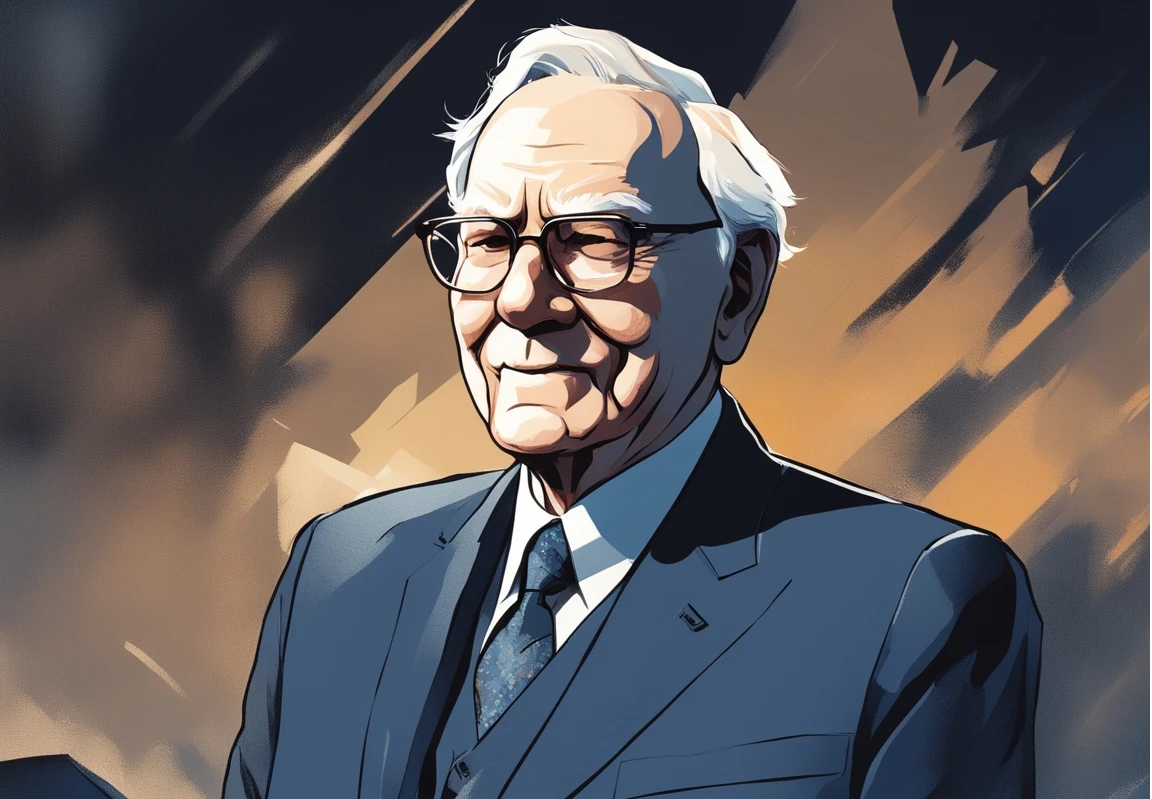Tags: Earnings
This fanpage is not officially affiliated with Berkshire Hathaway: Disclaimer
This year's shareholder meeting has been quite poignant, especially with Charlie Munger absent from the stage for the first time. We dive into the highlights of Berkshire Hathaway's first quarter 2024 earnings, which showcase robust operating earnings alongside some hurdles in the company's stock portfolio.

Introduction
In the ever-turbulent sea of global finance, the only constant is change. Amidst this unpredictable environment, Berkshire Hathaway stands as a beacon of stability and strategic acumen. This conglomerate, with its vast array of interests ranging from insurance and railroads to utilities and consumer goods, plays a pivotal role in the global economy. In the first quarter of 2024, Berkshire Hathaway presented a mixed financial tableau. While its operating earnings soared, demonstrating robust core business performance, net earnings saw a significant decline from the previous year 14.
This period also marked a notable shift in Berkshire's investment portfolio, particularly with a decreased contribution from Apple, which has been a substantial asset to the conglomerate's overall earnings 14. As we navigate through this article, we will delve into the specifics of Berkshire's financial outcomes, dissecting sector performances and strategic maneuvers executed during the quarter.
Moreover, the broader economic landscape, characterized by slow GDP growth and rising inflation, sets a critical backdrop for our discussion 5. This article will explore various dimensions including financial, historical, and economic analysis, providing a comprehensive view of Berkshire Hathaway's journey through the first quarter of 2024.
Berkshire's Operating Earnings
Operating earnings are a crucial metric for assessing Berkshire's core operational effectiveness, stripping out the noise of volatile elements such as investment gains or losses. In Q1 2024, Berkshire Hathaway’s operating earnings impressively climbed by 39% to reach $11.22 billion 234. This surge highlights the conglomerate's ability to generate profit from its primary business activities, despite broader market volatility.
However, the operating earnigns were hugely affected by the insurance sector, which may not be a constant contributor throughout the year:
Significant Contributors to Operating Earnings. The insurance sector, particularly underwriting, stood out with a staggering 185% increase in earnings, totaling $2.598 billion. GEICO, a major player within this sector, saw its earnings rise by 174% to $1.928 billion, underscoring a period of exceptional performance 2 ↗. This remarkable growth was primarily fueled by higher premiums and improved operational efficiencies. However, as Ajit Jain pointed out, it lies in the nature of insurance businesses that the first quarter is probably one the best ones. We may not expect four times the first quarter earnings for the entire 2024.
In addition to insurance, Berkshire's energy division, BHE ↗, nearly doubled its earnings to $717 million 2. This increase can be attributed to enhanced operational efficiencies and possibly favorable market conditions, which bolstered the sector's profitability. We will detail on BHE's results in a separate article.
To provide a clearer picture, let's compare the earnings from Q1 2023 to Q1 2024 across all Berkshire Hathaway sectors 1 - amounts in million dollars:
| Sector / Type | First Quarter 2024 | First Quarter 2023 |
|---|---|---|
| Insurance – underwriting | $ 2,598 | $ 911 |
| Insurance – investment income | $ 2,598 | $ 1,969 |
| BNSF | $ 1,143 | $ 1,247 |
| Berkshire Hathaway Energy (“BHE”) | $ 717 | $ 416 |
| Pilot Travel Centers (“Pilot”) | $ 67 | $ 83 |
| Manufacturing, service and retailing | $ 3,021 | $ 2,982 |
| Non-controlled businesses | $ 405 | $ 568 |
| Investment gains | $ 1,480 | $ 27,439 |
| Other | $ 673 | $ (111) |
| Net earnings attributable to Berkshire Hathaway shareholders | $ 12,702 | $ 35,504 |
This table not only highlights the operating earnings growth in insurance and energy but also points to a slight decline in railroad earnings, which decreased by 8.1% due to factors such as lower fuel surcharge revenues and changes in business mix 1. Furthermore, investment gains have seen a drastic decrease basically due to a significant decline of Berkshire's Apple position, which we will detail in the next section.
Historical Performance Trend. Examining the past five years, Berkshire Hathaway's operating earnings have shown a general upward trend, with occasional fluctuations. Last years first quarter operating earnings stood at $8.1 billion, whereas this year's first quarter has been $11.2 billion. To put this rise into perspective: for 2019, Berkshire reported operating earnigns of $24 billion for the entire year!
As we have outlined, Berkshire needs to be understood in frame of the operating earnings, not only its stock portfolio ↗. We have introduced the "Price over Operating Earnings" PoOE figure. Given a market capitalization of around $860 billion and assuming that we would see $40 billion in operating earnings this year, Berkshire Hathaway's Price over Operating Earnings (excluding investment gains!) stands at around 21.5. If this is cheap or expansive remains to be settled. However, you may want to compare this number to the S&P 500 PE ratio of around 25.
Berkshire Hathaway's operating earnings for Q1 2024 paint a picture of a company that not only navigates market volatility with strategic finesse but also capitalizes on its core strengths to foster growth within its subsidiaries. As we continue to explore other facets of Berkshire's operations and strategies in subsequent sections, the resilience and adaptability inherent in its leadership and business model become increasingly apparent.
There is of course noone better to explain the earnings this year than Warren Buffett himself during this years annual shareholder meeting:
Challenges in the Technology Sector
The technology sector has long been a cornerstone of growth and innovation within the global economy, and for Berkshire Hathaway, it has historically been a significant contributor to its investment earnings. However, recent shifts have posed new challenges. Notably, Berkshire Hathaway trimmed its Apple stake by 13%, a move that significantly impacts the portfolio's value 24. This decision reflects broader market conditions that are currently affecting tech stocks globally, including economic slowdowns and rising inflation rates 5.
Berkshire's Apple position was reduced from roughly $174 billion $135 billion from the end of 2023 to the end of Q1 2024 1. Apple closed at around $192 per share December 2023 and was down to about $171 by the end of Q1 2024. Therefore, the reduction in Berkshire's Apple position has been due to a drop in Apple stock but also a significant selling of Apple shares by Berkshire Hathaway. Please have a look how Buffett explained the sell of about 115 million Apple shares in the first quarter of 2024.
As you probably noticed, Buffett made a case for selling Apple stock to bolster Berkshire's cash reserves. It's an intriguing move, considering the company now boasts a record cash pile hovering around $189 billion 24, up from around $168 billion at the close of 2023 ↗ (float remained approximately unchanged at around $168 billion). This could be interpreted as a subtle suggestion that Buffett views the U.S. stock market as potentially overvalued. Currently, the S&P500 sports a PE ratio of around 25, implying a return on investment of about 4%, while bonds are yielding upwards of 5% (3 months treasuries).
So, was selling Apple a warning sign to other investors?!
Generally, the reduction in Berkshire's investment in Apple raises questions about the future of tech investments in a mid-to-high-inflation environment. Financial analysts and industry experts suggest that tech companies, which were once seen as nearly invulnerable to economic downturns, are now facing a reality check. The high inflation rates and the potential for increased interest rates to combat this inflation make high-growth tech stocks less attractive due to their future earnings being discounted more heavily.
Warren Buffett has historically navigated tech sector downturns by adhering to his investment philosophy of value investing and looking for opportunities where others see obstacles. The current tech sector challenges might prompt similar strategic moves, although the specifics will depend on how prolonged and deep the sector's issues become.
The Railroad and Utilities: Steady but Slow
In contrast to the volatile technology sector, Berkshire Hathaway’s subsidiaries in the railroad and utilities sectors have demonstrated more stability, albeit with slower growth. The railroad sector, represented by BNSF, saw an 8% decline in profits ↗, primarily due to unfavorable changes in business mix and lower fuel surcharge revenues 14. Despite these challenges, Warren Buffett has expressed continued confidence in the future of railroads, particularly BNSF, viewing them as integral to the backbone of American industry 3.
On the other hand, the utilities sector, under Berkshire Hathaway Energy, showed an increase in earnings, contrasting with the railroad sector's performance 1. This sector's growth, although steady, faces its own set of challenges, particularly under the current economic conditions characterized by slow GDP growth and higher inflation rates 5. These factors can affect operational costs and consumer demand, potentially impacting profitability.
Historically, Berkshire Hathaway’s strategic investments in these sectors have been based on their essential nature and consistent demand, making them reliable revenue streams. However, given the current economic climate, there may be a need for strategic adjustments to maintain and enhance profitability. This could involve investing in technology to improve operational efficiency or renegotiating contracts to better reflect current market conditions.
While the railroad and utilities sectors remain a vital part of Berkshire Hathaway’s portfolio, their slow but steady performance requires careful management and strategic foresight to navigate the challenges posed by the current economic landscape. Drawing on past strategic decisions, Berkshire is likely to take proactive steps to bolster these sectors, ensuring their continued contribution to the conglomerate’s overall stability and growth.
Impact of Economic Conditions on Berkshire's Strategy
The first quarter of 2024 presented a challenging economic landscape characterized by slow GDP growth at a mere 1.6% annualized pace, well below the anticipated 2.4% 5. This sluggish growth, coupled with still modest inflation rates, has significantly impacted consumer behavior, investment strategies, and overall business operations. Such conditions often lead to cautious spending by consumers and hesitancy among investors, creating a ripple effect across various sectors of the economy.
In light of these economic headwinds, Warren Buffett, Berkshire Hathaway's Chairman, highlighted the scarcity of attractive investment opportunities that meet the company's stringent criteria, both in the U.S. and globally 3. This statement not only reflects the immediate challenges posed by the current economic environment but also echoes past instances where economic downturns have necessitated strategic shifts within Berkshire. Historically, Buffett has steered the conglomerate through recessions by upholding a disciplined investment approach, often building up massive cash reserves during times of market overvaluation and uncertainty.
The potential for interest rate cuts, as predicted by investors, could further influence Berkshire's investment strategy 5. Such economic measures might make debt cheaper, possibly spurring more corporate activities and acquisitions, areas where Buffett's conglomerate could leverage its record high cash reserves of approximately $189 billion 24. This financial fortitude enables Berkshire to act swiftly when the right opportunities emerge, adhering to its long-standing principle of value investing.
Economic forecasts and expert opinions suggest a continuation of these challenging conditions, with potential deceleration in consumer spending 5. For Berkshire, this could mean a strategic recalibration towards investments in sectors less susceptible to economic downturns or perhaps an increased focus on international markets. The company's ability to adapt its strategy in response to economic conditions has been a cornerstone of its resilience and enduring success.
Berkshire's Future: Leadership and Legacy
The recent passing of Charlie Munger ↗, Vice Chairman of Berkshire Hathaway, marks a significant transitional phase in the company's leadership 4. Munger, alongside Buffett, transformed Berkshire from a textile mill into a global conglomerate. His departure sets the stage for Greg Abel ↗, who is set to assume the role of CEO following Buffett's tenure. Abel, currently managing all non-insurance business, brings a different set of skills and perspectives that could influence Berkshire's future strategy and operations.
Reflecting on Buffett’s enduring legacy, it is evident that his investment philosophy and leadership style have profoundly shaped Berkshire's market position ↗. As the company navigates this leadership transition, the primary challenge for Abel will be maintaining the conglomerate's robust performance while potentially steering it through the evolving economic landscape. His ability to do so will be crucial in sustaining investor confidence during this period of change.
The transition also presents an opportunity to reassess and possibly recalibrate the company's strategic direction. Under Abel’s leadership, there might be a greater emphasis on operational excellence and technological innovation, topics that are becoming increasingly pivotal in the global economy. Moreover, Abel's prior experience in managing Berkshire Hathaway Energy could see a deeper dive into green energy investments, aligning with global trends towards sustainability ↗.
The corporate culture at Berkshire, characterized by autonomy for subsidiary leaders and long-term value creation, is likely to continue. However, Abel may introduce new dynamics to this culture, potentially fostering more innovation and agility in operations. His leadership will also be tested on how effectively he can leverage Berkshire's massive cash reserves, especially in an environment where traditional value investments become scarcer.
As Berkshire Hathaway stands at the cusp of a new era under Greg Abel’s leadership, the conglomerate remains poised to continue its legacy of strategic foresight and robust financial performance ↗. The blend of traditional wisdom and new strategic approaches will be key to navigating the future, particularly in a volatile global economic landscape.
Here's how Warren Buffett sees how investment decisions will be made after his tenure. See for yourself how Greg will have a huge say in the process and why:
Conclusion
Berkshire Hathaway's performance in the first quarter of 2024 presents a nuanced picture of resilience and strategic leadership amidst market volatility and economic challenges. The conglomerate's operating earnings surged, driven by exceptional performances in the insurance and energy sectors, showcasing its ability to generate profit from core business activities. However, challenges in the technology sector, particularly the reduction in the Apple stake, highlight the impact of broader market conditions on Berkshire's investment portfolio.
The steady but slow growth in the railroad and utilities sectors underscores the importance of strategic management in navigating sector-specific challenges within the current economic landscape. As Berkshire Hathaway faces uncertain economic conditions marked by slow GDP growth and rising inflation rates, the company's strategic responses and investment decisions will be crucial in maintaining its financial health and market position.
Looking towards the future, the impending leadership transition at Berkshire Hathaway, with Greg Abel set to assume the role of CEO, presents an opportunity for recalibrating strategic direction and embracing new opportunities in sustainability and technological innovation. Abel's leadership will be tested in sustaining Berkshire's legacy of long-term value creation and financial performance amidst evolving market dynamics.
In the words of Warren Buffett, "In the business world, the rearview mirror is always clearer than the windshield." As shareholders of Berkshire Hathaway, it is essential to stay attuned to the company's strategic moves and adaptability in response to changing economic conditions. The enduring principles of investment and business management exemplified by Berkshire serve as guiding beacons in navigating the dynamic investment landscape. Stay tuned for Berkshire's future endeavors, as the conglomerate continues to demonstrate resilience and strategic foresight in an ever-evolving global economy.
References
-
Berkshire Hathaway operating earnings soar 39% as Buffett's cash hoard swells to record $188 billion - www.cnbc.com ↩↩↩↩↩↩
-
Berkshire Hathaway Adds to Cash Stockpile, Operating Income Improves in Q1 - www.investopedia.com ↩↩↩
-
Warren Buffett's Berkshire Hathaway sells 100 million Apple shares as cash pile and operating profit surge - fortune.com ↩↩↩↩↩↩↩↩
-
GDP growth slowed to a 1.6% rate in the first quarter, well below expectations - www.cnbc.com ↩↩↩↩↩↩










